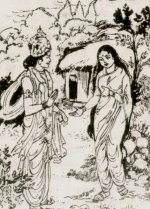Once upon a time, there lived two young men in a village. One was a weaver and the other a carpenter. They were very good friends, and were extremely attached to each other.
One day, they attended the annual village festival, which was a grand affair. People had come from far flung places to pay their respects to the deity.
One of the visitors was the young princess of their kingdom. All eyes were on her as she alighted from the elephant. Her long dark hair flew in the wind, while her lotus-shaped eyes took in all the happenings around her. Everyone seemed to be enraptured by her beauty, but the weaver fell in love with her the moment he set eyes on her. He could not take his eyes off her all day long, it was only when she left, that he turned to go back home.
The weaver was unable to get the princess out of his heart, and spent the night lost in her thought. Even the rising sun did not succeed in weaning him away from his dreams, and his friend was surprised by his behavior. “My friend, what is it that ails you?” asked the carpenter, in concern.
“My friend, I have fallen in love! This is the source of my unhappiness, for I know that I can never gain her hand!” replied the weaver, sadly. The carpenter continued to question his friend till at last, he learnt the whole story. He could not bear to see his friend grieve in this manner, and so he decided to help him.
“My dear friend,” he said, “Do not give up so easily. I assure you that I shall help you marry the princess.” The weaver was thrilled hearing his friend’s words, but he was also doubtful of success. “She lives in a palace surrounded by guards, and is the daughter of the king! How can I, a mere weaver, get to meet her, let alone marry her?”
The carpenter replied, “We may be ordinary men, but we are devout, and intelligent. If we use our intelligence, the Lord will surely help us achieve our goals. So, do not worry, but get ready and weave wonderful clothes for yourself so that you can meet the princess!”
Heartened by his friend’s assurance, the weaver got to work, and wove the most beautiful and expensive clothes he had ever made, his mind and heart fixed on the woman of his dreams.
Meanwhile, the carpenter was busy at work too. He returned the next day, bringing with him a mechanical contraption, which looked like the Garuda, the vehicle of Lord Vishnu. The bird was fitted with different levers, which enabled it to fly.
He taught his friend how to use the bird, and said, “Friend, using this bird, you can easily fly high over the houses in our kingdom and reach the palace. No one can obstruct you, and you can easily reach the palace, without bothering about the guards who maintain a watch over the princess. Go late at night, so that no one will observe you, but just in case someone does catch a glimpse, he will think you are the lord Vishnu, and thus you shall be safe. Just in case, dress yourself as Lord Vishnu, which will aid you in concealing your identity, as well as winning the hand of the princess.”
The weaver was so happy with the plan that he hugged his friend and thanked him, and began preparations for his night-time jaunt. He wore the wonderful clothes he had made for himself, and adorned himself with jewelry fit for a God, and prepared to meet his love. Bowing before the lord, and asking for His blessings, he set off towards the palace.
Easily avoiding the palace guards, the weaver made his way on his mechanical Garuda to the princess’ apartments. The princess was stunned to see the Lord in front of her, but even more surprised when he said, “O Princess, I have fallen in love with you and have arrived here to marry you. Please consent to be my wife!”
The princess replied, with all due modesty, “O lord, I am honored by your words, but I am just a mortal girl. How can I marry you? Besides, the goddess Lakshmi is your rightful consort. How can you approach me thus?”
The weaver was well prepared for just such a question, and replied with a smile, “My dear, it is you who are my wife, born in this form due to a curse. I have sheltered you from other suitors for so long, but now it is time for me to make you my wife.”
The princess blushed and replied, “In that case, my lord, please talk to my father and take his permission. I shall marry you at once with his blessings.”
The weaver interrupted her, “My dear, it is not easy for mortals to set eyes on me. They have to perform severe penances for just a glimpse of me. I cannot grant your father this boon without due cause. Marry me at once in the Gandharva style, or I shall curse your family!”
The princes did not want to be the cause of her family’s doom, and she was also thrilled by her good fortune in being the wife of Lord Vishnu. Agreeing to the terms laid down by the weaver, she married him in the Gandharva style at once. The weaver spent the night happily with his wife and left at dawn. Thereafter, he visited the princess every night and left before sunrise.
Meanwhile, the princess’ attendants suspected that the princess was meeting a man. However, since they did not see any man near the palace, they were confused. At last, one of them went to the king and voiced his suspicions.
The king was very angry when he learnt of the intruder, and he and his wife questioned the princess in detail. Unable to lie to her parents, she blurted out the truth – “My dear parents, you have no cause to worry, but instead, you should rejoice, for it is no common man who has chosen your daughter as his life partner. It is the Lord Vishnu himself, who comes to me every night. If you do not believe me, you can hide in my apartment and see Him for yourself tonight!”
The king and queen were so happy to hear this that they hid themselves that night and saw the weaver appear on his mechanical Garuda. The king was thrilled to see that it was the Lord Himself who had wed his daughter.
However, the knowledge that the Lord was his son-in-law led to the ego of the king getting a boost, and he started attacking the neighbouring kingdoms, sure that his son-in-law would come to his aid.
The neighbouring kings, however, were strong and united, and they attacked his kingdom in retaliation.
Faced with such a huge army, the king sent word to his daughter. “My dear,” he said. “I have waged war against our neighbouring kingdoms, relying on your husband’s aid, but now, the enemies are attacking our land, but there is no sign of your husband. Please ask him to come to help us wage war against our enemies.”
The princess obediently relayed her father’s message to her husband when he arrived that night. Now the weaver was in a quandary. But he bravely assured his wife, “My dear, why are you afraid of these mortal enemies? I shall crush them in a moment, do not fear! I shall appear in the battle and kill your enemies with my Sudarshan Chakra (discus)!”
The princess was comforted when she heard his words, and the king was pleased when he heard the news. He made arrangements for facing the enemy the next day.
The weaver meanwhile was in a fix. He did not know what to do. In a moment of recklessness, he had assured the princess that he would appear and slay the enemies. But what if the army recognized him as a simple weaver, and not Lord Vishnu? What if he was killed? On the other hand, if he did not appear on the battlefield, or just disappeared from the land, the attackers would surely kill the king and take the princess captive. He could not allow that! Even if she was safe, he could never see her again, and that was unbearable! Such thoughts tormented him all through the night, and finally, he came to a decision – he would go ahead and fly over the battlefield in his disguise. If he was killed, so be it. But there was just a chance that the army might mistake him for the genuine Lord and flee at once. He would give it a try, and trust the Lord to help him out of the mess.
Meanwhile, the real Lord Vishnu and his Garuda were having a related conversation. They had just learnt about the weaver who was going to dress up as the Lord and appear in the battle. This was a matter of concern, and Lord Vishnu said, “The weaver is prepared to meet his death bravely, but if he succumbs to a mortal’s arrow, people will lose faith in me. I can not allow that. The weaver has taken my form, and trusts in me to help him out, and I can not let him down. I myself shall go into battle at dawn tomorrow!”
The lord then instructed Garuda thus – “I shall enter the body of the weaver tomorrow and possess his chakra too. You must enter the mechanical contraption that he calls his vehicle, and must help me defeat the enemies.”
Accordingly, the next morning, when the weaver got himself ready for battle, he found himself infused with a new strength. Even his vehicle flew more like a real bird than ever, and he confidently entered the battleground, where he fought the army with ease, and killed the enemy king with his discus.
The army scattered with the death of their king, and onlookers were stunned to hear that it was the Lord himself who had aided their king! Meanwhile, as the Lord left the weaver’s body to go to His abode, the king and others recognized in him, the weaver of the kingdom!
At first, the king was wild when he realized that his son-in-law was not Lord Vishnu, but a humble weaver. But then, when the weaver related his story, the king realized that his son-in-law was not just an honest and clever man, but he was also an ardent devotee of the Lord, since the Lord himself had come to his aid. He decided to get his daughter married to him at once.
The weaver thus became a prince, and in time, the King. He ruled wisely and well, and always had complete faith in the Lord.
(Image from the Internet)







